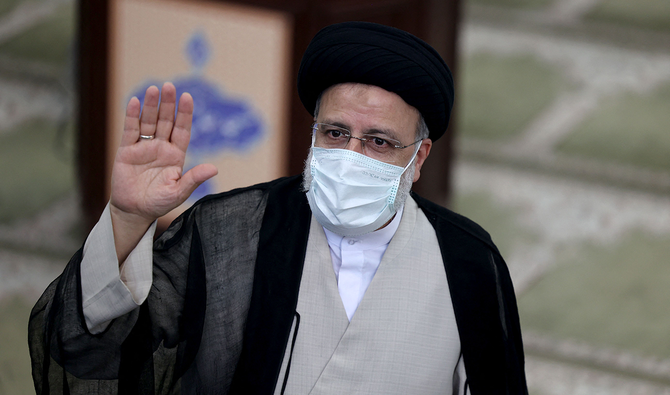
- ARAB NEWS
- 09 Jul 2025

It should not come as a surprise that Ebrahim Raisi won Friday’s 13th Iranian presidential election, as the regime was very determined to make him the next president. But what does his victory mean domestically, regionally and globally?
With Raisi’s victory, Iran’s hard-liners will control all the regime’s branches: The executive, the legislative and the judiciary. The last time they were in such a position was during Mahmoud Ahmadinejad’s presidency. Raisi will most likely choose members of hard-line organizations such as the Islamic Revolutionary Guard Corps (IRGC), the Quds Force, the Ministry of Intelligence and the paramilitary group Basij to fill his Cabinet.
Raisi, who has never held elected office, will be the first Iranian president since 1979 to be under US sanctions even before taking office. He is subject to US sanctions due to his involvement in the 1988 massacre of political prisoners. He was a member of the “death commission” that executed more than 30,000 people, including children and pregnant women, during the purge.
Domestically, the regime is facing a crisis of legitimacy due to widespread voter apathy and Friday’s low turnout, which indicate that an overwhelming majority of the Iranian people are disenchanted and dissatisfied with the Islamic Republic and its elections. Anahita, a teacher from Tehran, told me: “I did not go to vote. Like many people, I did not have a candidate. So why should I vote? The mullahs had a candidate and that was Raisi.”
After all, the Islamic Republic orchestrated a sham election, with the Guardian Council disqualifying anyone who could be a viable rival to Raisi, the favored candidate of the hard-liners and Supreme Leader Ali Khamenei. The Guardian Council even disqualified top regime insiders such as Ali Larijani. It is worth noting that three members of the 12-member Guardian Council were chosen by Raisi and six more were appointed by the supreme leader.
With Raisi’s presidency, the regime will more than likely intensify its repression at home. Raisi’s history as a merciless prosecutor and judge has shown that he will not hesitate to suppress those who oppose the Islamic Republic or pose a threat to its survival. That is why the regime ensured his victory — as Khamenei and the senior cadre of the IRGC believe they can silence opposition more effectively and end the growing power struggle between the moderates and the hard-liners by having a president who not only agrees with them, but also facilitated the path.
Raisi’s history shows he will not hesitate to suppress those who oppose the Islamic Republic or pose a threat to its survival.
Dr. Majid Rafizadeh
This means that the freedoms of speech, press and assembly will be further suppressed and the international community will likely witness more human rights violations committed by the Iranian authorities. But as we have seen in the past, the Iranian people will not remain silent. Unrest and widespread protests are very likely.
It is critical that Western policymakers and the entire international community make it clear that they support any effort by the Iranian people to push back against state repression and advocate for democracy.
Raisi is also likely to be the IRGC and Khamenei’s favored candidate to be the next supreme leader. The position of president can be a crucial stepping stone to the top job. It is worth noting that, when Ayatollah Khomeini died in 1989, Khamenei was the sitting president.
Regionally speaking, the Iranian regime’s destabilizing behavior, aggressive policies and military adventurism will increase under a hard-line president. Hard-liners believe in the revolutionary ideals of the Islamic Republic and exporting those principles beyond Iran’s borders. It follows that the IRGC and its elite branch, the Quds Force, will be more empowered and emboldened under Raisi. He is a staunch supporter of Khamenei and the regime’s military institutions and revolutionary principles. The regime’s anti-Western — and specifically anti-American — policies are likely to ratchet up during Raisi’s presidency due to the fact that he, as a hard-liner, shares the same anti-Western philosophy as the supreme leader.
Nevertheless, this does not mean that Raisi’s administration will abandon the nuclear deal or halt the ongoing talks if the outgoing administration and the P5+1 world powers don’t agree a revival of the 2015 nuclear agreement before Hassan Rouhani leaves office. The Iranian regime is cash-stripped and is desperate to rejoin the nuclear deal in order to have US sanctions lifted. The regime may even delay the talks until Raisi is in office in order for the hard-liners to take credit for the lifting of sanctions.
With Raisi’s victory, the hard-liners have solidified their grip on power over all branches of government. Under his presidency, the Iranian regime will likely become more aggressive and militaristic in the region, more repressive at home, and more defiant on the global stage.